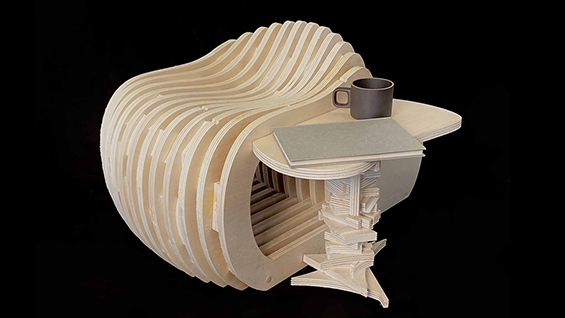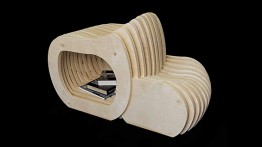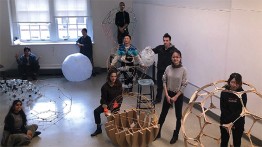The Digital Fabrication Summer Program: Design-Build Education
The Digital Fabrication Summer Program: Design-Build Education
Program Description | Eligibility, Application, Costs, and Summer Kit | Program Policies | F.A.Q.
July 6 - July 30, 2022 | 4-weeks | In-Person Sessions Monday - Thursday, 11AM-2PM EST.
Student daily tutorial and desk-critique sessions will be assigned to either 9AM-11AM EST or 2PM-4PM EST.
We are no longer taking applications for this program.
This in-person, 4 -Week summer intensive builds on the approaches learned in our Introduction to Architecture Online: Foundation Studies and Portfolio Development for High School and College Students programs to explore the relationship of form, material, and technology across scales, through prototyping and design-build education. Students will develop a foundational understanding of digital design and fabrication through project development using Rhino 3D modeling, laser-cutting, 3D printing, and CNC technologies.
This program is taught by Instructor Kiki Goti along with presentations by Cooper Union faculty, alumni, and guest lecturers. The AACE Lab and The Digital Media Lab will be used extensively throughout the course to give students the opportunity to learn to use state-of-the-art technology for the production of their prototypes. 3D printing, fabrication and computation technologies complement the learning modalities offered by The Cooper Union through their extensive experimentation possibilities.
Students will develop innovative tectonic systems and interscalar design-fabrication strategies, integrating material intelligence and advanced technologies in a playful but critical way. Through material and formal investigations and systematic design iterations, students will be guided to create large scale prototypes that showcase the potential of their tectonic system. Investigations in materials, textures, colorations and patterning techniques will be coupled with advanced digital tools in order to develop a series of chairs.
The chair projects will introduce students to design and fabrication methodologies through hands-on work guided through collective and individual-based prompts supported by periodic mentorship and discussion sessions. The course is taught by a team of interdisciplinary Cooper Union faculty and student instructors, and extended by guest lectures and review sessions with thinkers and practitioners from inside and outside the institution. Feedback will be constructive, and actively structured to encourage students to share, process and develop their projects in an open, safe, and supportive environment.

The program is structured in two sections, the first section exposes students to a wide range of methodologies and workflows in the field of digital design and fabrication. In the spirit of Cooper Union pedagogy, lab sessions are paired with lectures, providing historical and theoretical context to student projects. In the second section of the course, students will work in small research groups to hone a more in-depth understanding of one or more techniques, materials, and geometries presented in the first part of the workshop. Students are challenged to be imaginative, think through making, and to collaborate across disciplines while developing an understanding of their own field of interests within a larger context of digital fabrication and creative technology. Situated in the living laboratory of New York City, we’ll explore creative technology to correspond with its life, future, and complexity.
Why take the course?
Over the course of the program, the students will develop digital fabrication methods along with a set of physical projects that can grow their portfolio and their exposure to techniques and critical perspectives. The design faculty will work with each student, individually and as a group, to review and discuss their work. The projects and experience gained in the program may be used as part of the college and professional application process. Our curriculum helps students develop critical reflections while delving in creative uses of digital fabrication technology. Our students will gain the following:
- Facility with workflows between digital design software and fabrication hardware for art, architecture and engineering projects such as sculptures, models, and prototypes.
- Technical proficiency in design software and hardware.
- A body of work for college admission portfolios and employment applications.
- Exposure to a dedicated college faculty mentorship where lectures, tutorials, and critical discourse become key in future creative advancement.
- Intellectual and critical thinking skills through college-level discussions.
- The opportunity to enter a learning community committed to the intersections between art, architecture, and engineering.
- The opportunity to interact with students with diverse creative interests.
- Professional connections through unprecedented accessibility to faculty and guest critics.
- College credits eligible for transfer to another institution.
| Eligibility |
Students from all academic fields are welcome and encouraged to apply. Prospective students need not be currently enrolled in an academic institution but are required to have completed coursework in or have practical knowledge of Rhino 3D as covered in our Introduction to Architecture Online summer program. You may refer to the Foundation Studies and Portfolio Development for High School and College Students program description to assess potential equivalent courses in your educational history and/or contact us with any questions. |
| Application |
Applicants will fill out an application form including a statement of no more than 300 words expressing their interest in the program and one reference letter. Admission is on a rolling basis; successful applicants will be accepted based on previous academic work and all submitted statements, as space allows. We recommend that you submit your application as early as possible. Applicants may access the online application here. Application Deadline: June 1, 2022. Enrollment Deadline: June 14, 2022 Applicants accepted to the program will be notified on a rolling basis beginning in late March. No applications will be reviewed after June 7, 2022. Applications should be submitted by June 1st in order to allow the admissions committee time for final review by June 7. Students accepted before or by June 7 are expected to confirm their enrollment by June 14 at the latest. |
| Cost and Fees |
Program Tuition: $2,980. Basic fabrication materials cost is included in tuition. Application Fee: $40 Online Summer Kit: See information in the section below to assess additional costs. Successful applicants will be responsible for paying the program cost in full upon acceptance. The course may be cancelled prior to start date based on Covid related regulations and/or incomplete class enrollment.* * Except in cases in which classes are cancelled, all application fees and program costs are non-refundable. |
| Housing |
Housing is not available during the summer sessions through The Cooper Union. |
| Online Summer Kit |
Students are required to have access to a PC or MAC computer for the duration of the summer program that meets system requirements to run Rhino and Adobe Creative Suite. Please see our Hardware Specification and Software Installation Instruction Page for guidance on the required technology for digital design and course participation. Rhino is required and available as a free trial. The Cooper Union will provide full access to Adobe Creative Cloud applications for the duration of the School of Architecture Summer Programs. You will be sent login, download, and installation instructions shortly before the start of the program. Access will expire immediately following Final Reviews. Students who do not currently own a computer may look into monthly rental options. |
Program Policies
Grades, Evaluations, and Credit
The Digital Fabrication Summer Program offers college credit upon successful completion of the program. Individual assignments, class participation, and attendance will be evaluated by the faculty.
Successful completion is determined by the instructors and the administration of the School of Architecture and will be based on attendance, satisfactory completion of assignments, participation in group critiques, design work and productivity, and adherence to the program's Code of Conduct.
Class attendance is carefully monitored and factored into grades. Students are expected to attend all classes unless they are ill.
In-Person Participation
Class attendance is mandatory. Unexcused absences can lead to dismissal from the program. In the event that a student is dismissed due to unexcused absences, no portion of tuition will be refunded. Students are expected to engage seriously in their studies through class participation, completion of assigned work, and critique. Disruptive behavior in any form will not be tolerated.
Academic Integrity
The Cooper Union is committed to preserving an environment that challenges every student to realize their potential. You are expected to provide your best effort and will be supported to produce original work of the highest caliber. Plagiarism is the presentation of another person’s “work” (ideas, words, equations, computer code, graphics, lab data, etc.) as one’s own. Plagiarism in any form is not tolerated and may lead to dismissal from the program.
Code of Conduct
The Code of Conduct is designed to ensure the safety and well-being of the students and the integrity of the college. It is strictly enforced and failure to abide by them results in dismissal from the Introduction to Architecture Online for College Students. A student’s adherence to the Code of Conduct is determined by the instructors and administration of the School of Architecture.
In the event a student is dismissed due to violating the Code of Conduct, he/she/they will not receive a Certificate of Completion and no portion of tuition will be refunded. Students who have been dismissed are not permitted to participate in the remainder of the online program.
Frequently Asked Questions
I do not have any architecture experience. Can I participate?
Students are required to have practical knowledge of Rhino 3D as covered in our Introduction to Architecture Online summer program or equivalent coursework elsewhere. You may refer to the Foundation Studies and Portfolio Development for High School and College Students program description to assess potential equivalent courses in your educational history and/or contact us with any questions.
Are there any specific math or engineering skills necessary? What about computer software skills?
Students who wish to enroll in the Digital Fabrication Summer Program are not required to have specific skills beyond general computer literacy and practical knowledge of Rhino 3D as mentioned above.
What is the attendance policy? What if I have to miss a class?
The program is full-time and conducted in-person, Monday through Friday, 9AM-4PM EST. Daily tutorial and desk-critique session times will be assigned in accordance with project requirements. Attendance is mandatory and students should expect to spend time outside of class developing their projects. Full participation is necessary to remain enrolled in the program. Students with 3 unexcused absences will be automatically dismissed from the program. In the event that a student is dismissed due to 3 or more unexcused absences, he/she will not be refunded for payment of the program.
What happens after the program ends?
The Digital Fabrication: Design/Build Education program culminates in a set of individual and group projects that can be used as portfolio pieces for applying to a professional degree program in architecture. The practical knowledge attained through this program is on demand in today's job market. Students are eligible for college credit upon successful completion of the program.
I am an international student. May I apply to the Summer Programs offered Online?
No. The Cooper Union does no sponsor I-20 Visas and F-1 student status to enroll and/or participate in this program.
Are scholarships available?
Scholarships and Financial Aid are not available for this program.
What equipment and/or materials will I need to bring?
All accepted students to the Summer Programs will be responsible to procure a PC or MAC and to install and successfully run Adobe Photoshop, Adobe Illustrator and a free trial of Rhino. Please refer to the "Online Summer Kit" section above and the Hardware Specifications and Software Installation Instructions Page for more information.
Can credit from the Summer Programs later be applied towards a bachelor’s or master's degree?
The Cooper Union is accredited by the Middle States Association of Colleges and Schools (MSA) and the School of Architecture is accredited by the National Architectural Accrediting Board (NAAB). Students will receive a transcript for credits earned; credits are transferred at the discretion of the student’s home institution or the prospective institution the student is applying to.
For any further questions please contact architecture.summer@cooper.edu
* Except in cases in which classes are cancelled, all application fees and program costs are non-refundable.






